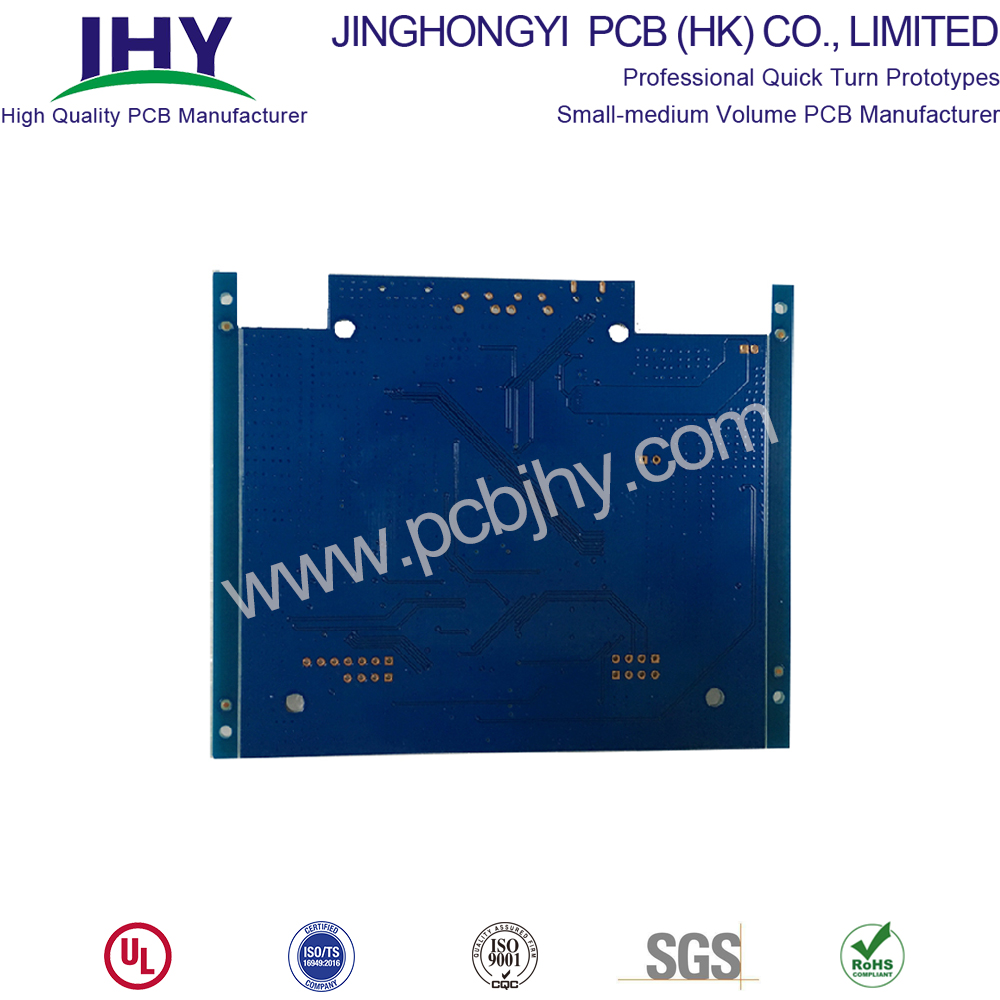Airflow pulverizer has short-board speed and noise improvement
The 8 layer PCB is a circuit board with 8 layers that are stacked firmly together with predefined and dependable mutual connections between the layers. Structure of eight layer PCB is more complicated. Nowadays, PCBs frequently have 8 to 12 layers or more, and electronics engineers know that designing for so many layers requires a well-configured layer stack.
8-layer printed circuit boards are usually installed in compact equipment with strict spacing requirements, such as notebook computer motherboard, communication backplane, wearable watches, etc. Because of its complexity and high manufacturing costs, your 8-layer PCB manufacturing should be made by reliable and experienced manufacturers. Jinghongyi PCB has been specially targeting high-end PCB manufacturing and assembly services for 8 years, providing high-quality products and services for various customers. Our advanced production line and fast response team will keep you comfortable and reassured, without any trouble, you can rest assured to place the order with us.
Standard stackup of 8 layer PCB looks as follows
8 Layer PCB Stack up
8 Layer PCB stackup
A typical 8 Layer PCB Stackup
0.062[8 layer PCB stackup
0.093[ 8-Layer PCB Stackup
8 LAYER 1.6 MM STANDARD STACKUP AND THICKNESS
JHYPCB is one of the leading 8 layer PCB manufacturers. For more information, pls send email to us.
PCB Circuit Board,8 Layer PCB,Custom multilayer pcb,Custom 8 Layer PCB JingHongYi PCB (HK) Co., Limited , https://www.pcbjhy.com
According to the industry, compared with the mechanical crusher, the jet mill has high crushing strength and high energy utilization rate. The jet mill can reach 2%-10%, while the ordinary crusher is only 0.6%. The equipment structure is simple and can be carried out. Aseptic effect, easy to clean, the product after pulverization is fine, up to a few microns or even sub-micron, and keep the particles regular and smooth. In addition, the jet mill can perform combined operations such as pulverization and drying, pulverization and mixing, pulverization and chemical reaction in the machine.
Although the advantages of the jet mill are obvious, there are also some shortcomings. For example, there are many auxiliary equipments and high cost. When the crushing system is clogged, the dumping phenomenon will occur, and a large amount of dust will be sprayed to deteriorate the operating environment; the crushing materials have limitations, such as Materials containing more oil, water and fiber are not easily crushed.
Many users also reported that the domestic airflow pulverizer still has defects such as slow smashing speed and high noise.
It is understood that after 20 years of development in China's airflow mill machinery industry, the market scale has been very large, and it has been involved in many fields such as pharmaceutical and chemical industry. However, from the overall level of the industry, China's airflow pulverizer technology is relatively backward compared with foreign countries, and its development is subject to certain constraints.
Some experts said that at present, domestic airflow pulverizer R & D companies are facing more than 90% of overcapacity. Therefore, the sustainable development of the jet mill industry requires a comprehensive consideration of many factors, eliminating the problems of high noise, limited materials, slow pulverization, low efficiency, etc., and develops a pulverizer that meets the needs of the pharmaceutical industry, using products with high technical content. Conquer the market.
With the improvement of the equipment structure and the improvement of the pulverization technology, the defects of the domestic airflow pulverizer are gradually being overcome in the process of large-scale and automatic exploration of the device.
It is reported that a crusher enterprise has developed a new type of combined airflow crushing equipment, which has better performance than traditional jet mill and mechanical crushing. It has low energy consumption, short process area, no dust pollution, and low heat generation. The finished product has fine grain size, wide pulverization range, unlimited water content of the material, and unlimited particle size, which can replace imported equipment.
In general, China's jet mill industry is breaking through the bottleneck of development. With the advent of the intelligent automation era, intelligence and automation have become an inevitable trend in the future development of the machinery industry. Under this background, the jet mill industry will also cater to the market. The demand continues to move toward intelligent automation.
In addition, in the process of continuous development of the pharmaceutical industry and intensified competition, pharmaceutical companies pay more attention to cost control. High performance, high reliability, high maneuverability, good maintainability and economical equipment are becoming the products that users are pursuing. The industry said that modular design principles, methods and technologies will be an effective way to explore the manufacturers of jet mills.
8 Layer PCB - Stackup & Cost & Prototype manufacture
What is 8 layer PCB?
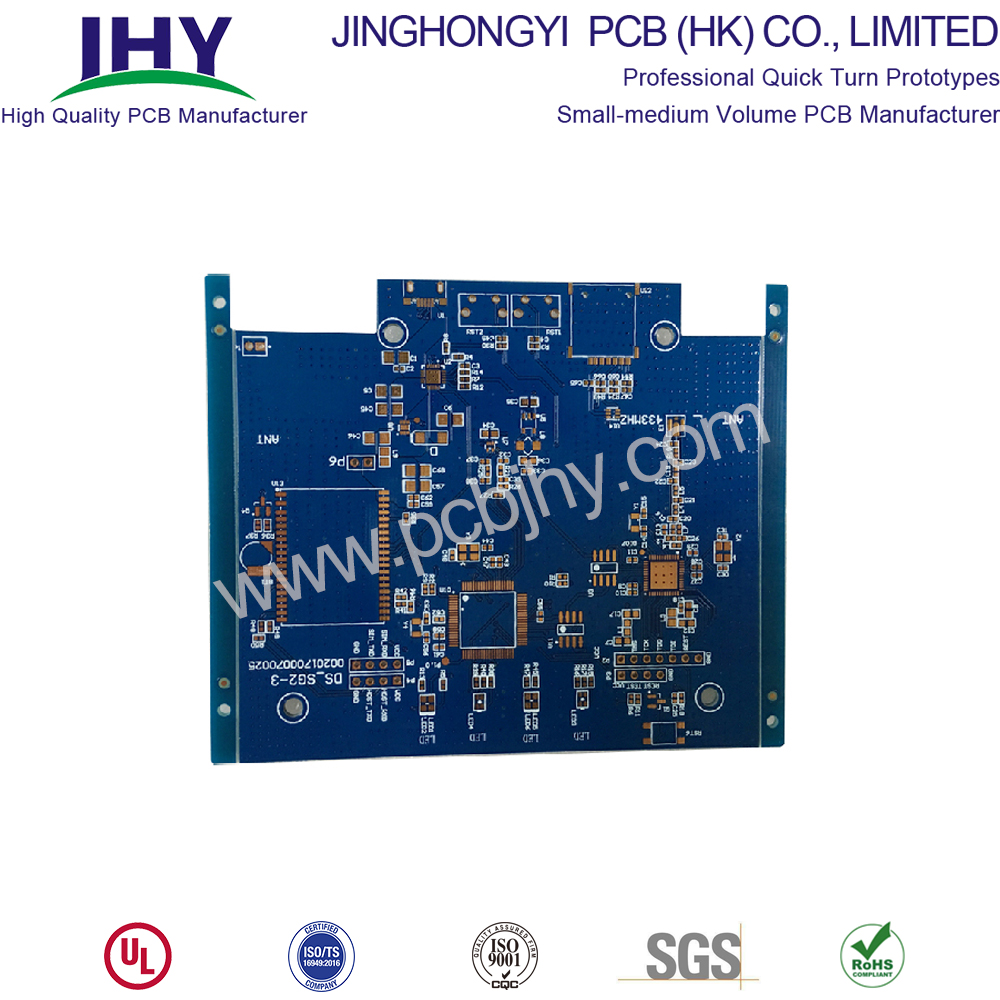
Typical 8-layer PCB stack up methods and guidelines
Eight-layer PCB can be used to add two additional layers, or two planes can be added to improve EMC performance. Most eight-layer circuit boards are superimposed to improve EMC performance, rather than adding additional wiring layers. Compared with 6-layer circuit boards, the cost increase percentage of 8-layer PCB is less than that of 4-layer PCB to 6-layer PCB. Therefore, in order to improve EMC performance, the cost increase is reasonable. Therefore, most 8-layer boards consist of four wiring layers and four planes.
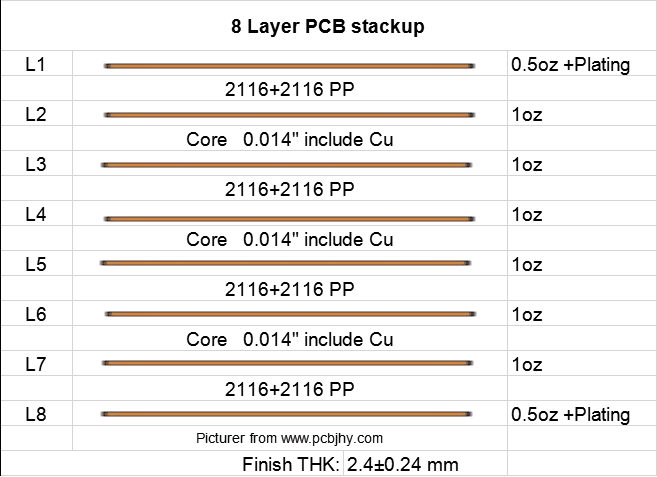
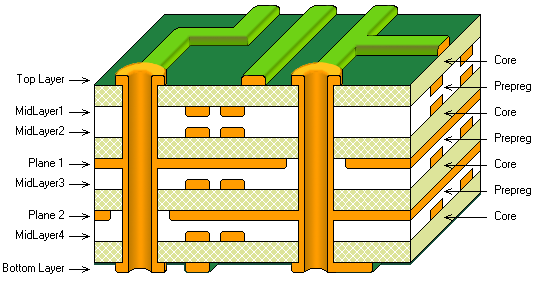
In short, 8 layer PCB are usually used to improve the EMC performance of circuit boards, rather than increasing the number of layers.
No matter how you decide on the stack layer, it is not recommended to use an 8-layer PCB board with six wiring layers. If you need six routing layers, you should use a 10 Layer PCB board. Therefore, the 8-layer board can be regarded as the six-layer board with the best EMC performance.
Basic Layer of Eight-Layer Circuit Board with Excellent EMC Performance
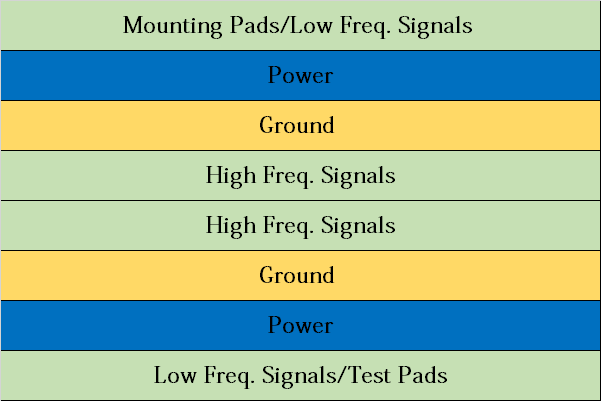
All signal layers are adjacent to the plane, and all layers are tightly coupled. High-speed signals are buried between planes, so planes provide shielding to reduce the transmission of these signals. In addition, the circuit board uses multiple grounding layers to reduce the grounding impedance.
Other forms of 8-layer PCB stackup
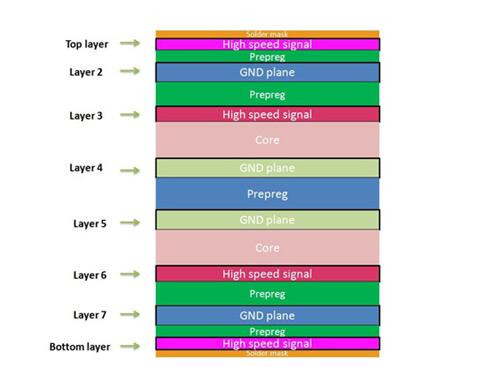
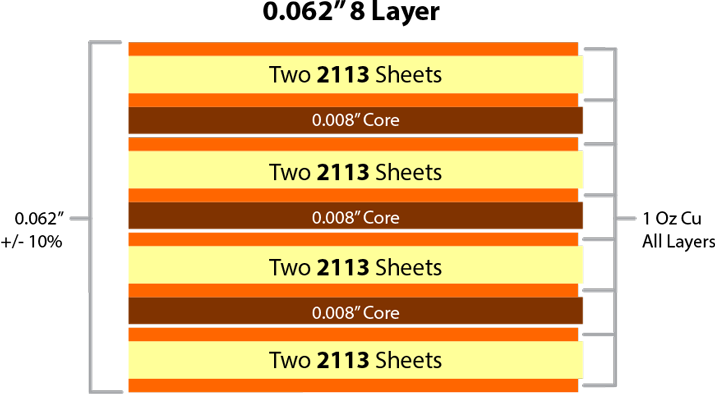
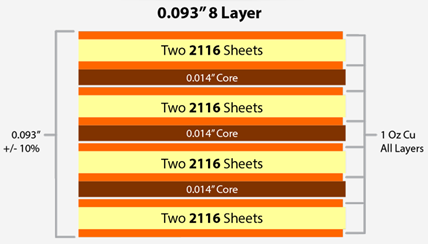
So far, we have also clarified the cost and price differences between 6-layer PCB, 8-layer PCB and 10-layer PCB.
8 Layer PCB thickness
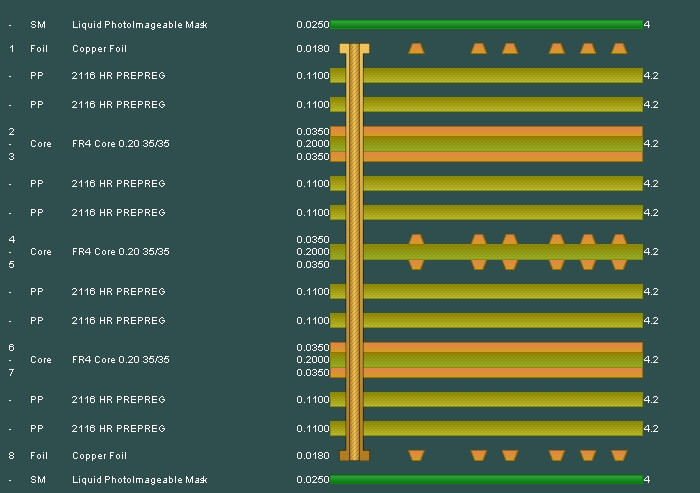
8 Layer Stackup - 1.6mm thickness
layer order
layer name
material type
material description
dielectric constant
thickness
copper weight
1
top
copper
signal
0.035mm
1 oz
2116
prepreg
4.5
0.12mm
2
inner 1
copper
plane
1 oz
core
4.6
0.3mm
3
inner 2
copper
plane
1 oz
7630
prepreg
4.7
0.2mm
4
inner 3
copper
plane
1 oz
core
4.6
0.3mm
5
inner 4
copper
plane
1 oz
7630
prepreg
4.7
0.2mm
6
inner 5
copper
plane
1 oz
core
4.6
0.3mm
7
inner 5
copper
plane
1 oz
2116
prepreg
4.5
0.12mm
8
bottom
copper
signal
0.035mm
1 oz
Final board thickness: 1.6mm±0.13mm
8-Layer Prototype PCB Manufacturing Service
The 8-layer prototype FR-4 PCB is an 8-layer circuit board, which is firmly stacked together with predefined and reliable interconnection between layers. The 8-layer FR-4 PCB has more complex structure. JHYPCB is a large enterprise located in Shenzhen, China, which can manufacture 8-layer prototype PCB.
JHYPCB can provide you with multi-layer PCB board in accordance with RoHS standard. With laminated material, it can match high temperature in assembly process. Importantly, some lead-free assembly processes will require laminated substrates to withstand temperatures exceeding 260 degrees Celsius or 500 degrees Fahrenheit over a longer period of time. To solve this problem, we have high temperature laminates in stock, so that our customers can meet the higher temperature cycle requirements of some lead-free assembly applications.
